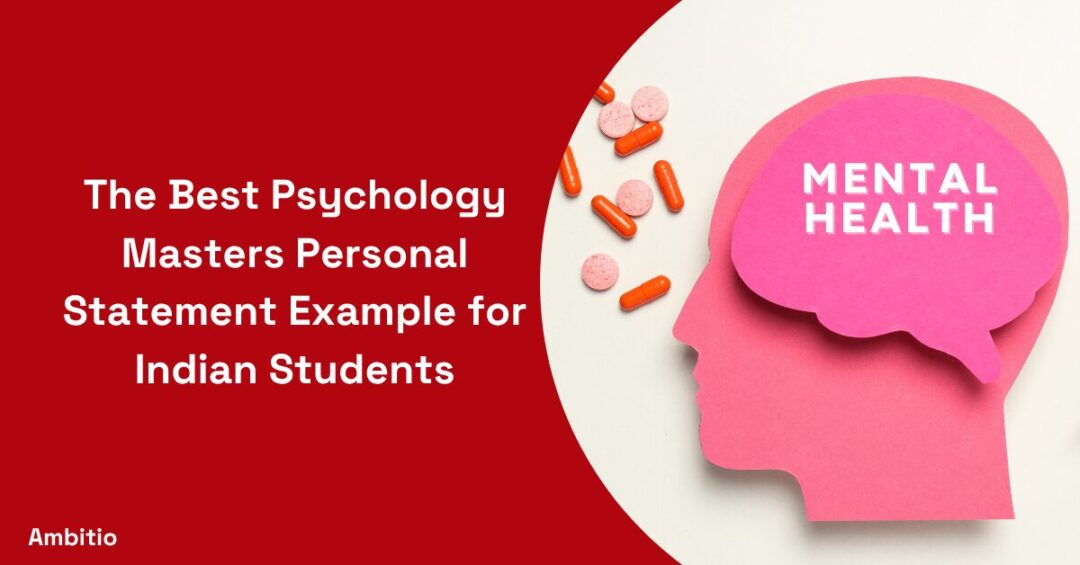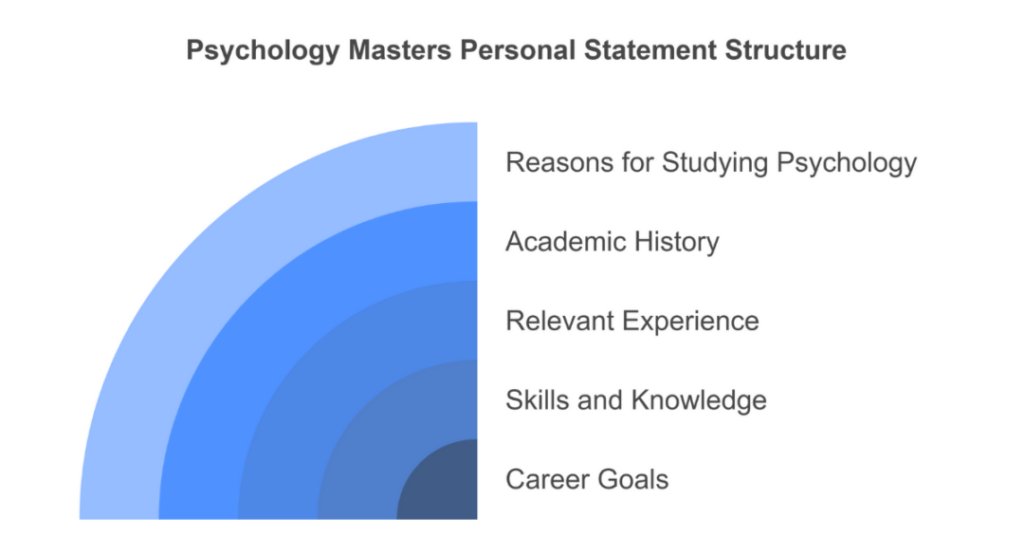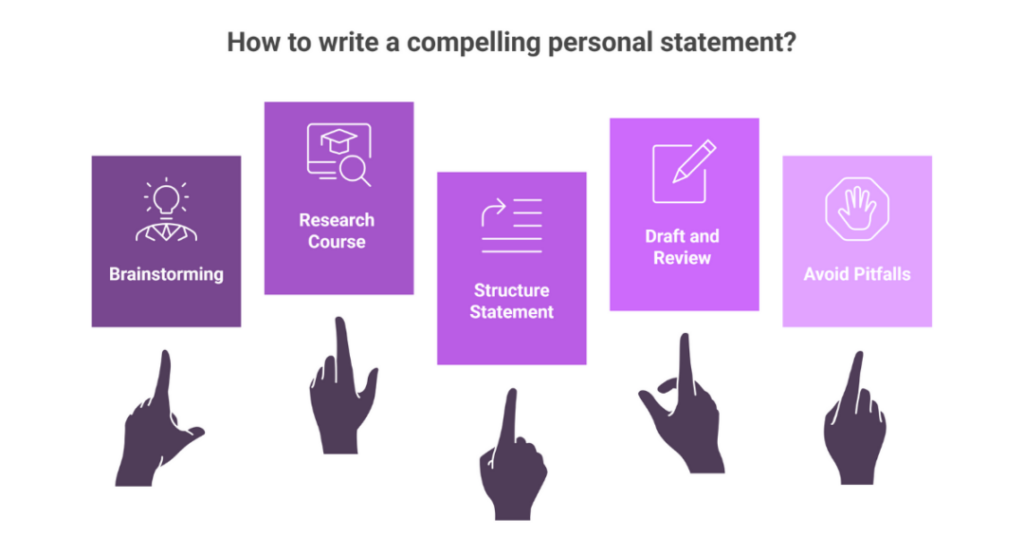29 May 2025
5 minutes read
The Best Psychology Masters Personal Statement Example for Indian Students

Key Takeaways
- Psychology masters personal statement tips help Indian students align their career goals, academic interests, and work experience with international programs.
- Psychology masters personal statement examples demonstrate how to showcase relevant skills, research experience, and passion for psychology effectively.
- Psychology masters personal statement guidance ensures your application stands out by focusing on clinical psychology, conversion courses, and personal motivation.
Indian students seeking master’s psychology programs abroad frequently struggle with converting their personal experience into powerful personal statements.
With the number of postgraduate degrees in clinical psychology and cognitive studies increasing throughout the world, crafting a personal statement that wins over your application is important. The majority of students wonder how to start or what to write in their personal statement.
This tutorial provides a step-by-step guide to crafting a solid personal statement that expresses your career aspirations, applicable skills, academic interests, and experience in psychology-related settings.
If you are applying for a conversion course in psychology or seeking an advanced degree program in psychology, this article will give you useful tips, advice, and a sample psychology personal statement suitable for Indian students.
So, if you’re asking yourself how to write a personal statement for masters that celebrates your interest in psychology and conforms to international application standards—keep reading.
What is a Masters Personal Statement for Psychology?
Surprising fact: Certain universities read your personal statement, letter of recommendation and statement of purpose before even seeing your grades. That makes this paper your initial handshake with the admissions committee.
A personal statement is some autobiographical material detailing your reasons for applying, academic history, experience, and interest in psychology. It’s your opportunity to demonstrate that you’re not merely another application, but the ideal candidate for the course.

The following is what a psychology personal statement must entail:
- Evident reasons for studying psychology and your individual areas of interest.
- How your undergraduate degree and courses developed your academic interests.
- Any relevant work experience opportunities, especially in mental health or clinical research.
- Skills and knowledge gained from placements or experience working with psychological theories and research methods.
- Career goals that align with the master’s program you’re applying for.
What are the Key Elements of a Strong Personal Statement?
Fun fact: Some admission panels spend as little as five minutes reading each application. A strong personal statement needs to grab their attention instantly.
When writing your own personal statement, clarity, structure, and authenticity matter. The content should be tailored to reflect your passion for psychology and commitment to the field.
Here are the key elements, structured in a table for clarity:
| Element | Description |
|---|---|
| Catchy Opening | Begin with a compelling reason or moment that sparked your passion for psychology. Avoid cliched phrases. |
| Academic Background | Mention your undergraduate degree, dissertation, coursework, and academic interests related to core areas like behavioural science or cognitive abilities. |
| Work Experience | Highlight any practical experience—such as working as a research assistant, internships, or clinical exposure—that provided insight into psychological theories and mental health conditions. |
| Relevant Skills | Discuss skills and knowledge needed in psychology such as communication, empathy, analytical thinking, and understanding of methodology. |
| Career Aspirations | Show alignment between your career goals and what the master’s program offers. Connect your aims with becoming a clinical psychologist or pursuing clinical research. |
| Professional Tone | The writing you submit should follow a professional tone, be well-structured, and completely proof read. |
How to Write a Personal Statement for Postgraduate Program in Psychology?
Fun fact: Your personal statement can influence scholarship decisions. It’s more than just a requirement—it’s an opportunity.

Ready to write a personal statement that sets you apart? Use this checklist as a guide to stay on the right track when writing:
- Brainstorming: Start by jotting down your motivations, relevant knowledge, and career aspirations.
- Research the Course: Tailor your statement to each university by understanding their psychology master’s courses and specializations.
- Structure Matters: Use clear paragraphs that follow a logical order—introduction, academic background, work experience, skills, and conclusion.
- First Draft to Final: Don’t expect perfection at once. Review and proofread your first draft multiple times.
- Avoid Common Pitfalls: Don’t include cliched statements. Avoid repetition, and stay under the word limit.
Psychology Personal Statement Example for Masters
Fun fact: Psychology is the second most popular major in the U.S. after business.
Here’s a clinical psychology personal statement example to help you understand how everything fits together:
Meet Riya, a BSc Psychology graduate from the University of Delhi, now applying to King’s College London.
“Ever since I assisted my cousin through her battle with anxiety during our teenage years, I realized how deeply the human mind fascinates me. It wasn’t just empathy—I wanted to understand the why behind our behaviour. That curiosity led me to pursue a Bachelor of Science in Psychology, where I explored everything from social science to cognitive abilities.
During my undergraduate degree, I conducted a dissertation on the impact of social media on adolescent mental health. This research experience helped me learn core research methods, data interpretation, and academic writing. Working as a research assistant during my summer break further exposed me to the practical challenges of psychology.
I also completed a placement at Mind Clinic, Mumbai, where I shadowed a clinical psychologist. This hands-on experience with mental health conditions strengthened my desire to work in this field. I participated in community outreach, interacted with patients, and learned about treatment methodologies.
In parallel, I prepared for my IELTS, TOEFL, SAT, ACT and GRE, balancing rigorous coursework with GRE prep. My scores reflect my dedication—an IELTS band of 8.0 and a GRE score of 321.
I want to study at King’s College London not only because of its reputation but also due to its focus on clinical research and mental health interventions. The master’s program curriculum closely aligns with my career goals of becoming a licensed clinical psychologist. I’m especially drawn to modules related to cognitive neuroscience and psychological intervention techniques.
My passion for psychology stems from both academic interests and lived experiences. I have the practical experience, theoretical foundation, and a drive to make a difference. This master’s program is the right next step in my journey.”
Conclusion
Writing a strong personal statement is about demonstrating who you are and why you fit in a psychology master’s program. Indian students tend to bring their own perspectives based on varying social environments and educational experiences.
Your personal statement needs to showcase your reasons for studying, related work experience, academic experience, and concise career ambitions.
Always mention in your personal statement the particular reason for pursuing the program, how it is connected with your aims, and what expertise and knowledge you are bringing to it.
With our examples of psychology personal statements and strategic advice, you can now face writing a personal statement with confidence. Just make sure you research the course, brainstorm well, create a good personal statement, and proofread.
If you wish to study clinical psychology, a conversion course in psychology, or an advanced degree program overseas, your application rests in large part on how you write a personal statement. Use this as your guideline and model to begin the process of admissions success.
Choose Ambitio and make your dreams come true!
FAQs
What should I include in my psychology masters personal statement?
Your psychology masters personal statement should include your academic background, relevant work experience, research methods exposure, and your motivation for pursuing an advanced degree in psychology.
How long should a psychology masters personal statement be?
A psychology masters personal statement typically ranges between 500 to 1,000 words, depending on university guidelines. Make sure your psychology masters personal statement is concise yet comprehensive.
Can I use a psychology masters personal statement example for different universities?
While a psychology masters personal statement example can offer inspiration, always tailor each psychology masters personal statement to align with the specific course structure and faculty interests of each university.
How do I make my psychology masters personal statement stand out?
To make your psychology masters personal statement stand out, include unique experiences, clear career goals, and showcase your passion for psychology through concrete examples and academic achievements.
Do Indian students need to address cultural context in their psychology masters personal statement?
Yes, Indian students can enhance their psychology masters personal statement by reflecting on how cultural background influences their understanding of psychological theories and human behavior.
Is work experience mandatory for a psychology masters personal statement?
Work experience isn’t mandatory but including it in your psychology masters personal statement strengthens your application by demonstrating real-world application of psychological knowledge and relevant skills.
Should I mention standardized test scores in my psychology masters personal statement?
If test scores like IELTS, GRE, or TOEFL are strong, you should briefly mention them in your psychology masters personal statement to highlight your preparedness for international academic rigor.

You can study at top universities worldwide!
Get expert tips and tricks to get into top universities with a free expert session.
Book Your Free 30-Minute Session Now! Book a call now




























